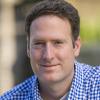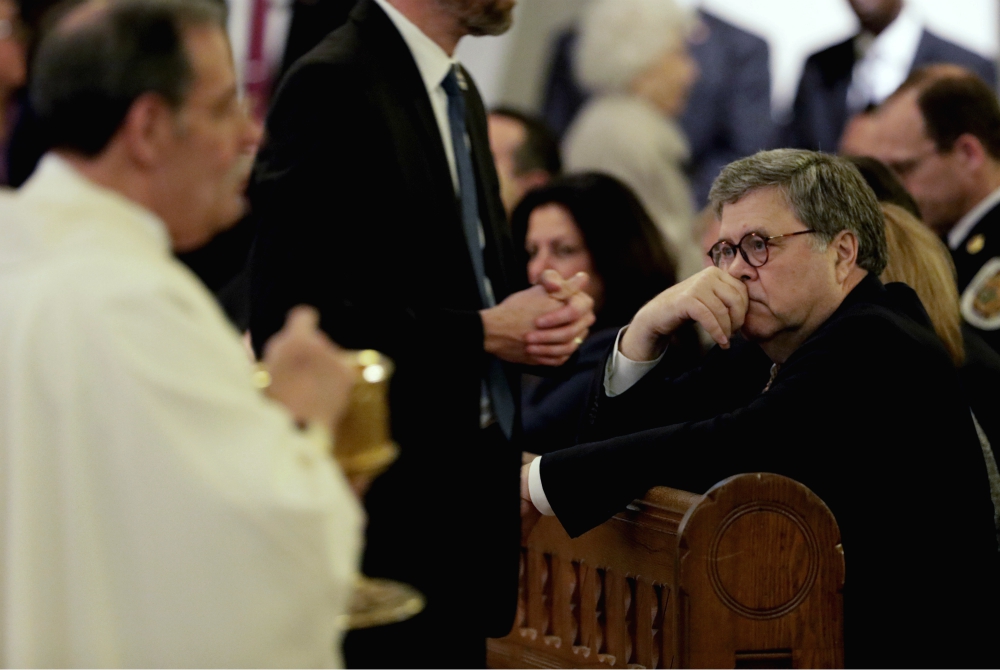
U.S. Attorney General William Barr attends the annual Blue Mass for law enforcers and firefighters at St. Patrick's Catholic Church in Washington, D.C., May 7, 2019. (Flickr/U.S. Customs and Border Protection/Glenn Fawcett)
After mounted police and tear gas cleared a path of peaceful protesters in Lafayette Park for a presidential photo-op last month, President Donald Trump — who almost never attends religious services — posed with a Bible in hand, silent and brooding. As the surreal scene played out live on television in front of St. John's Episcopal Church, the most influential Catholic in the Trump administration, Attorney General William Barr, stood close by.
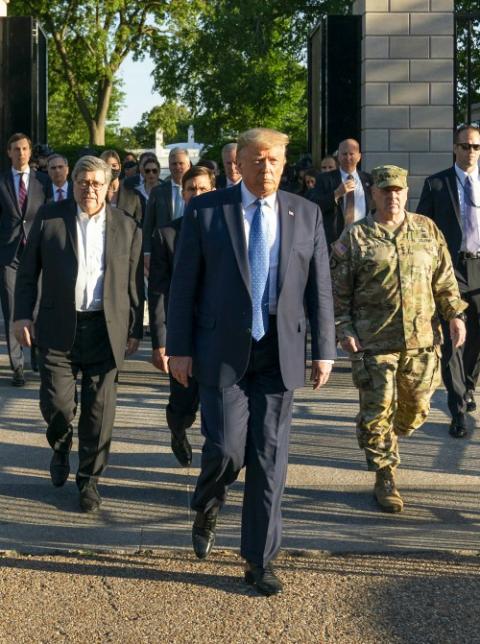
President Donald Trump walks from the White House June 1 for a photo-op at St. John’s Episcopal Church. Attorney General William Barr is at left. (Wikimedia Commons/The White House/Shealah Craighead)
The proximity was fitting. There have been few more stalwart loyalists to the president — who has cycled through cabinet officials and routinely publicly berates his staff — than Barr, a nearly four-decade veteran of Republican administrations, and a conservative Catholic who vigorously promotes a muscular Christianity that relishes in fighting the culture wars.
Barr helped pave the way for last week's federal executions — the first in 17 years. Yet he is often viewed as an ally of the pro-life movement because of his opposition to abortion. His enthusiastic admirers also cheer what they regard as his commitment to religious freedom at a time when many social conservatives view the rights of churches and religious institutions as under threat by secular forces.
Barr's critics counter that a Catholic at the highest level of government uses his influence to endorse a selective, ideologically driven understanding of religious liberty, and champions a nearly limitless view of executive power that is particularly dangerous, given Trump's disregard for bedrock democratic norms.
Of the myriad forces that have shaped Barr's views on politics, law and religion, a constant has been his connections to a tight-knit Catholic culture where fraternal organizations, think tanks and conservative clergy understand faith as a bulwark against perceived attacks on traditional morality, the family and church. While the attorney general doesn't name-drop theologians or directly cite the influence of Catholic doctrine, he draws both from longstanding Christian principles, and the grievance politics of the Christian right.
NCR did not receive any response to requests to the Department of Justice's media office for a statement from Barr about what his Catholic faith means to him or about Catholic leaders' criticism of his involvement in bringing back federal executions.
Religious right rhetoric
At 70, Barr has a low-key demeanor and a flat delivery style that belies his inclination to toss rhetorical grenades and frame issues in nearly apocalyptic terms.
At a widely covered speech at the University of Notre Dame last fall, Barr railed against "militant secularists," language reminiscent of Jerry Falwell's rhetoric in the 1980s at the start of the religious right movement.
Secularism, he said, could be blamed for "virtually every measure of social pathology," including "the wreckage of the family," "soaring suicide rates," "alienated young males" and a host of other social ills.
"Suffice it to say that the campaign to destroy the traditional moral order has brought with it immense suffering, wreckage, and misery," the attorney general said at an Oct. 11 event hosted by Notre Dame's Law School and the de Nicola Center for Ethics and Culture.
He lamented what he called the "macro-morality" of the welfare state and of "collective action to address social problems."
In contrast, he argued that Christianity "teaches a micro-morality" where "we transform the world by focusing on our own personal morality and transformation," an observation that ignores centuries of Christian teaching about pursuing the common good and social justice.
Patrick Deneen, professor of political science at the University of Notre Dame, declined an interview with NCR but at the time lauded Barr's talk, saying on Twitter that it was a "masterful, learned, and extremely important speech that should be widely read and pondered." Responding to critics of the speech, Deneen chided liberals' reaction as a "collective fainting spell."
Thomas Berg, a professor who specializes in law and religion at the University of St. Thomas School of Law in Minneapolis, agrees with the attorney general on several things: federal funding for parochial schools; the right of religious institutions to terminate employees who violate their church's moral teachings or institution's ethical codes; and that real burdens on religious liberty exist.
Berg filed a Supreme Court brief supporting Jack Phillips, the Colorado baker who argued on religious liberty grounds that he should not have to bake a wedding cake for a gay couple. But Berg also filed a brief supporting same-sex marriage in the landmark 2015 case Obergefell v. Hodges.
But Berg cautions that the attorney general's articulation of religious liberty at Notre Dame was problematic.
"His description of religious liberty is selective and that threatens to make religious liberty a vehicle for polarization rather than a solution to it," said Berg. "A real problem for the cause of religious freedom in general is that the loudest voices use it or confine it to only support their political side."
The attorney general, Berg added, "says nothing about the religious freedom of Muslims, Sikhs or non-Christian religious minorities, or how the president's travel ban arose from his hostile comments about Islam. You can't claim a commitment to religious liberty and be wholly selective about it."
Politics of Christian grievance
Barr grew up in a conservative family surrounded by liberals on the Upper West Side of Manhattan. His Catholic mother, Mary, sent her four sons to Corpus Christi elementary school. Barr's older brother Stephen, now a physicist, heads the Society of Catholic Scientists. A Vanity Fair article profiled Barr’s father, a controversial educator at elite New York private high schools in the 1960s, '70s and '80s. Born Jewish, the elder Barr became "more Catholic than the Catholics," according to the article.
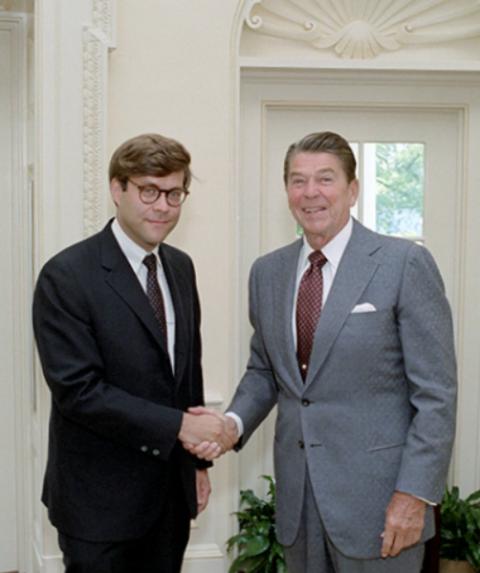
William Barr shakes hands with President Ronald Reagan during a National Security Council meeting in the Oval Office Aug. 9, 1983. (Ronald Reagan Presidential Library)
In first grade, William gave a speech supporting Dwight Eisenhower for president and, according to a New Yorker magazine profile, when he backed Richard Nixon's candidacy a nun promised to pray for him.
Barr graduated from Columbia University and later George Washington University Law School, climbing the ranks in the Ronald Reagan administration as a deputy assistant director for legal policy at the White House. After George H.W. Bush's election, Barr was appointed to run the Justice Department's Office of Legal Counsel, advising the president and all federal agencies. Bush named him attorney general in 1991.
Barr and his wife, Christine, live in McLean, Virginia, not far from CIA headquarters. All three of his daughters attended a Catholic school in Bethesda, Maryland, outside of Washington, where his wife also worked. His daughter Margaret graduated from the University of Notre Dame in 2006.
He has long been passionate about defending a robust role for religion in public life, and is not a newcomer to the politics of Christian grievance. "We live in an increasingly militant, secular age," Barr wrote in The Catholic Lawyer in 1995. "As part of this philosophy, we see a growing hostility toward religion, particularly Catholicism."
Barr argued that religious Americans are the real victims in a shifting culture. "It is no accident that the homosexual movement, at one or two percent of the population, gets treated with such solicitude while the Catholic population, which is over a quarter of the country, is given the back of the hand."
Cathleen Kaveny, a professor at Boston College who has written widely about the intersection of law, religion and morality, describes Barr as having "a kind of authoritarian Catholic thought and an elitist vision that is not particularly comfortable with the give and take of a democracy."
In the Notre Dame speech, Kaveny was struck by Barr's description of personal sin that focused on appetites and bodily disorders.
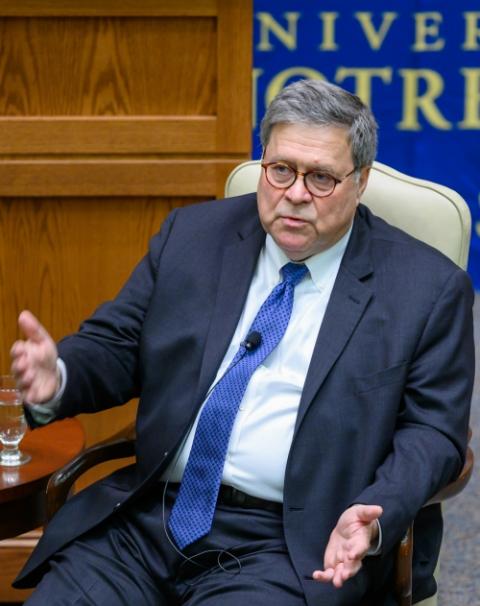
Attorney General William Barr speaks in the McCartan Courtroom Oct. 11, 2019, at the University of Notre Dame's Law School in Indiana. (CNS/University of Notre Dame/Matt Cashore)
"This is more than culture-war language," she said. "It almost looks like an Opus Dei influence because it's a notion of sin that is primarily personal and about self-control. That's not an entirely Catholic view of sin and leaves out Catholic social teaching about social sin."
While Barr is not a member of Opus Dei, according to his Senate questionnaire, from 2014 to 2017 he served on the board of the Catholic Information Center, an Opus Dei-affiliated bookstore and chapel a few blocks from the White House that is a longtime hub for conservative intellectuals, Republican politicians and other well-connected Catholics in the nation's capital.
Other prominent board members at the center have included Leonard Leo, co-chairman of the Federalist Society, which helped shepherd the Supreme Court nominations of Brett Kavanaugh and Neil Gorsuch through the Senate confirmation process. White House counsel Pat Cipollone, who led Trump's defense during the Senate impeachment trial, also previously served on the Catholic Information Center's board. Cipollone was a speechwriter for Barr during the first Bush administration.
Another Barr speechwriter during the Bush years was John Wauck, who was later ordained an Opus Dei priest. "He struck me then — as he strikes me now — as an extremely intelligent man, low-key, affable and straightforward," Wauck, a professor at the Pontifical University of the Holy Cross in Rome, told NCR. "It was clear to me that he was a serious Catholic."
Conservative hero
The attorney general's efforts to combat pornography and human trafficking have drawn praise from the U.S. Conference of Catholic Bishops.
"We wish to ... commend your department on its work to end human trafficking and unlawful exploitation," the bishops' conference wrote to Barr in April. "We write to you today to urge you to confront the ongoing harms wrought by the pornography industry and to protect its victims."
Yet on other issues that bishops and Catholic advocates have long made a priority — lobbying for comprehensive immigration reform, protecting immigrants brought to the United States as children, and ending the death penalty — the attorney general has taken steps that run in the opposite direction of the church.
Advertisement
Barr announced in February that the Trump administration was implementing a "significant escalation" against sanctuary cities for "unconstitutionally interfering" with federal efforts to enforce immigration law. But last month, the U.S. Supreme Court refused to take up the Trump administration's challenge to a California law that limits state and local cooperation with federal immigration authorities. And the Trump administration also suffered a setback in the Supreme Court last month when justices ruled that the administration could not immediately end the Obama-era Deferred Action for Childhood Arrivals program, which is protecting approximately 700,000 young immigrants, often called Dreamers, from deportation.
But many conservatives view Barr as "a hero in the religious liberty world," according to Ashley McGuire, a senior fellow with the Catholic Association, an organization based in Washington, D.C., that focuses on religious liberty issues. The attorney general has used his role, McGuire argues, "to restore a robust understanding of religious liberty to the Department of Justice after it took a serious beating during the Obama administration."
She points to the Department of Justice prosecution of hate crimes against people of faith and its challenging so-called Blaine Amendments in state constitutions that prohibit federal funds from religious schools. The U.S. Supreme Court supported the Justice Department last month when it ruled the amendments unconstitutional.
R.R. Reno, editor of First Things, praised Barr in an article last year for taking up the mantle of traditional values in his speech at the University of Notre Dame. "Those in public office need to speak clearly and forcefully about the moral truths that are the foundation of a free society," Reno wrote. "And when the political and legal traditions of our country are hijacked by progressives, who are on a political crusade complete with dogmas and anathemas, our leaders need to fight back."
As part of his Senate confirmation hearing to become Trump's attorney general, Barr listed associations with several organizations that play a key role in advancing issues central to the conservative Christian movement, including the Knights of Columbus. A member since 1984, he has provided legal counsel to the Knights on tax exemptions. For three years in the 1990s, Barr noted on the Senate confirmation forms, he was a "Supreme Board Member" of the Knights.
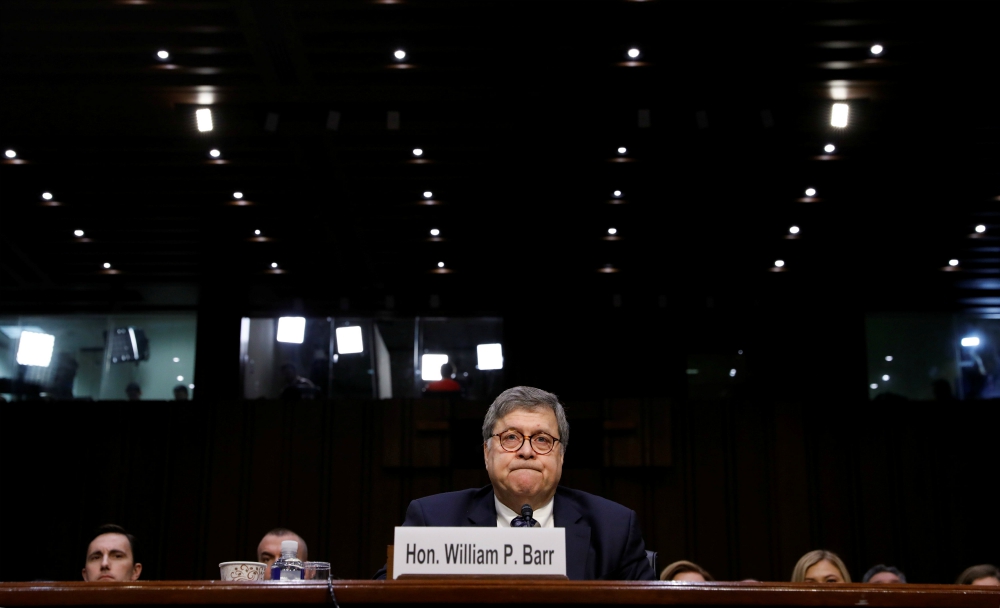
William Barr, nominated for U.S. attorney general, testifies before the U.S. Senate Judiciary Committee during his confirmation hearing Jan. 15, 2019, in Washington. (CNS/Reuters/Kevin Lamarque)
The fraternal organization is led by Supreme Knight Carl Anderson, who was once a staffer for segregationist Sen. Jesse Helms and who held several posts in the Reagan administration. Along with its charitable work in the United States and around the world, the Knights have used part of its $2 billion in revenue over the years to help fund the U.S. bishops' religious liberty campaigns and political efforts to fight same-sex marriage.
The attorney general also served on the board of the Becket Fund for Religious Liberty for two decades until 2015. Becket has led a lengthy legal fight on behalf of the Little Sisters of the Poor, a religious order that has argued its religious liberty rights were violated by the Obama administration's contraception-coverage requirements under the Affordable Care Act. Becket also represented the national craft-store chain Hobby Lobby, whose evangelical Christian owners won a landmark Supreme Court decision in 2014 that found they did not have to provide contraceptive coverage for its female employees as required under the act. The Becket Fund declined a request to comment for this article.
Catholic and other critics
Not surprisingly, Barr has many critics on the left, including Catholic liberals. But even former Republican officials and those known for defending religious liberty express concern about his legal and constitutional views.
Douglas Kmiec met Barr at the end of the Reagan administration when the senior President Bush appointed Barr to succeed Kmiec as head of the office of legal counsel. Now an emeritus professor of constitutional law at Pepperdine University, Kmiec praises Barr's "wry sense of humor" and says it's "enjoyable to be in his company."
"Bill Barr personally is a serious man of faith and family," he told NCR.
But Kmiec is critical of Barr's "rather one-sided understanding of the Constitution" and his "sweeping conception of presidential power," which makes him a "perfect appointee for President Trump," he said.
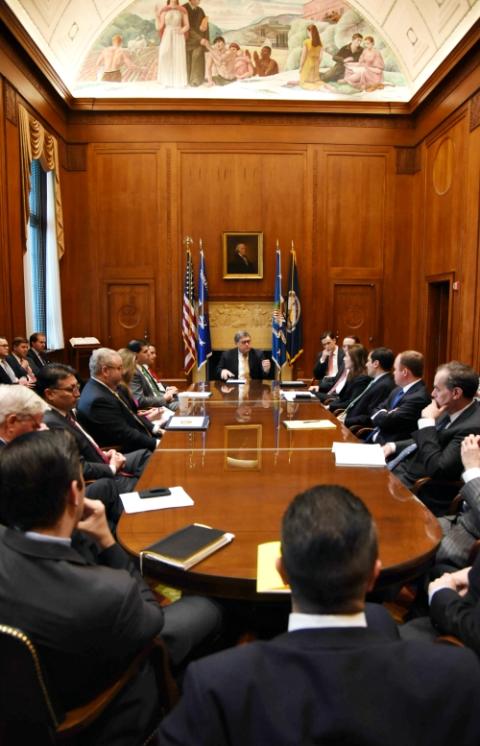
William Barr meets with Justice Department leadership at the White House Feb. 14, 2019, the day he was sworn in as attorney general of the United States. (Wikimedia Commons/U.S. Department of Justice)
The attorney general "does not conduct business then or now with the idea of listening to all sides and producing a consensus outcome," Kmiec said.
"Moderate or center-left positions are off the table before the participants in the meeting are seated," he said. "And even if you were nominally a conservative, Bill's idea of conservative is likely to be far more to the right, and if you weren't careful you would be secretly labeled as a squish to be avoided."
Melissa Rogers, a visiting professor in the Divinity School at Wake Forest University who served as director of the White House Office of Faith-based and Neighborhood Partnerships under President Barack Obama, pointed to what she views as the Department of Justice's skewed approach to religious liberty cases.
While the Trump administration routinely grants religious conservatives' requests for accommodation, it is less generous to free exercise claims from those who provide humanitarian assistance to migrants in deserts on the country's Southwest border, for example. It also demanded that a Catholic diocese surrender part of its property for the construction of a border wall, despite the fact that the diocese opposes these actions for religious reasons.
"An administration certainly does not have to grant every free exercise claim to be a bona fide proponent of religious freedom," Rogers said. "But it is striking to see how differently free exercise claims are treated when they do not align with the administration's policy priorities."
Douglas Laycock, a prominent scholar of religious liberty law at the University of Virginia who has argued for both same-sex marriage and the rights of religious objectors before the U.S. Supreme Court, questions Barr's commitment to religious liberty at all.
"He clearly cares about conservative Christians and protecting their liberty. He is at best less concerned with the religious liberty of everybody else," Laycock said, noting that such an attitude is not rare in the United States today.
"Lots of Americans on all sides are deeply committed to protecting liberty for themselves and the people they agree with, and unconcerned with or affirmatively hostile to liberty for the folks they disagree with," he said. "But it is a serious problem, and a bit unusual, for the attorney general of the United States to act that way. The attorney general is charged with enforcing all the laws and protecting the rights of all the people."
In February, more than a thousand former Department of Justice officials released an open letter calling for the attorney general to resign after senior department officials intervened to reduce a prison sentencing recommendation for Roger Stone, Trump's longtime friend and a veteran political operative convicted of obstruction, lying to Congress and witness tampering in special counsel Robert Mueller's probe into possible collusion between Russia and the Trump campaign during the 2016 presidential election. A federal judge in March released a stinging 23-page opinion that said Barr distorted the findings of Mueller's report.
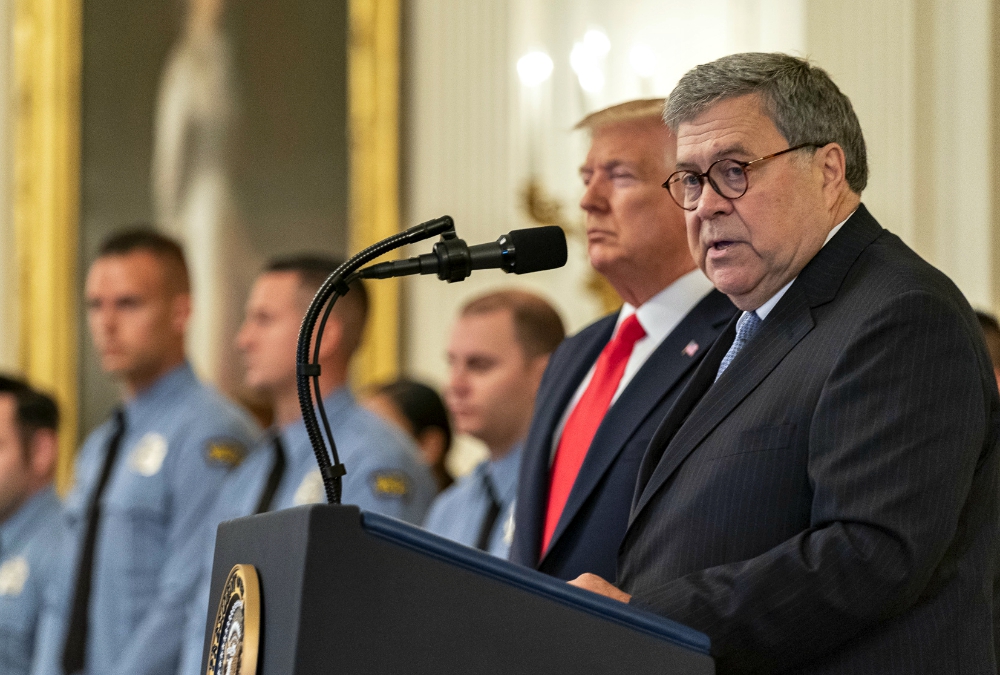
Attorney General William Barr delivers remarks at a Medal of Valor and Heroic Commendations ceremony Sep. 9, 2019, at the White House. (Flickr/The White House/Shealah Craighead)
The attorney general's decision to resume federal executions after a 17-year hiatus has also provoked strong reaction, including from religious leaders. More than 1,000 people of faith, including Catholic bishops, evangelical and mainline Christian leaders, denounced the move in a July 7 statement: "As our country grapples with the COVID 19 pandemic, an economic crisis, and systemic racism in the criminal legal system, we should be focused on protecting and preserving life, not carrying out executions."
Pope Francis built on previous popes' teachings and officially revised the catechism in 2018 to state that the death penalty is "inadmissible" in all cases because it is an "attack on the inviolability and dignity of the person."
This has not stopped the National Catholic Prayer Breakfast from choosing to honor Barr with its Christifideles Laici Award. "Barr's long history of dedicated public service and his commitment to the defense of the vulnerable and religious liberty make him a perfect person to receive the award," the organization said in a statement announcing the honor.
The prayer breakfast, postponed because of the coronavirus, is now scheduled for Sept. 23. The organization's founders include several Catholic advisers to past Republican presidential candidates, along with Leo of the Federalist Society and Cipollone, Trump's attorney during the Senate impeachment trial.
But as a growing number of conservatives are now opposed to the death penalty, and several GOP-controlled state legislatures have ended or taken steps to cease the practice, Barr seems out of step with shifting public opinion over the last decade, said Krisanne Vaillancourt Murphy, executive director of the Catholic Mobilizing Network, a national organization that works to end the death penalty.
"People like Attorney General Barr and President Trump are hanging on to old vestiges of what was considered being 'tough on crime,' " she said. "It's profoundly disappointing and even infuriating. We were hopeful that someone who takes their faith seriously would uphold the sanctity of all life."
[John Gehring is Catholic program director at Faith in Public Life, and author of The Francis Effect: A Radical Pope's Challenge to the American Catholic Church.]
